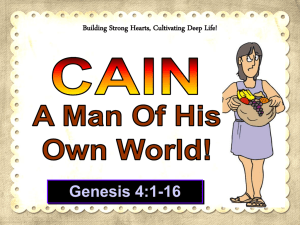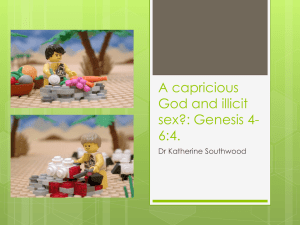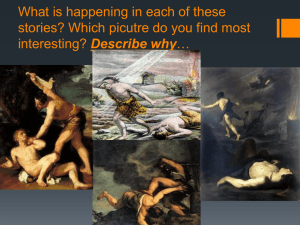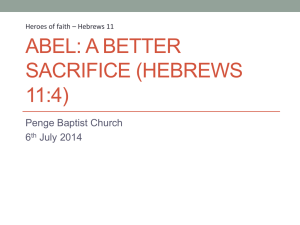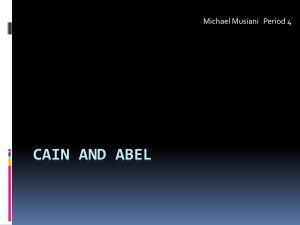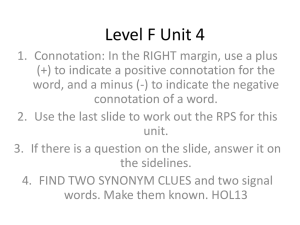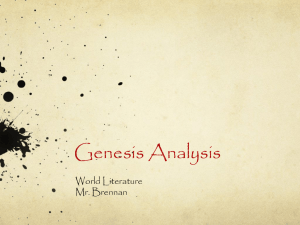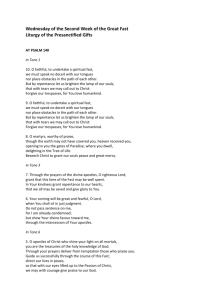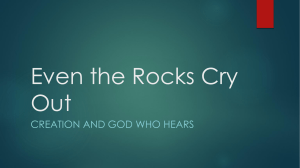Genesis 4 - biblecriticism
advertisement
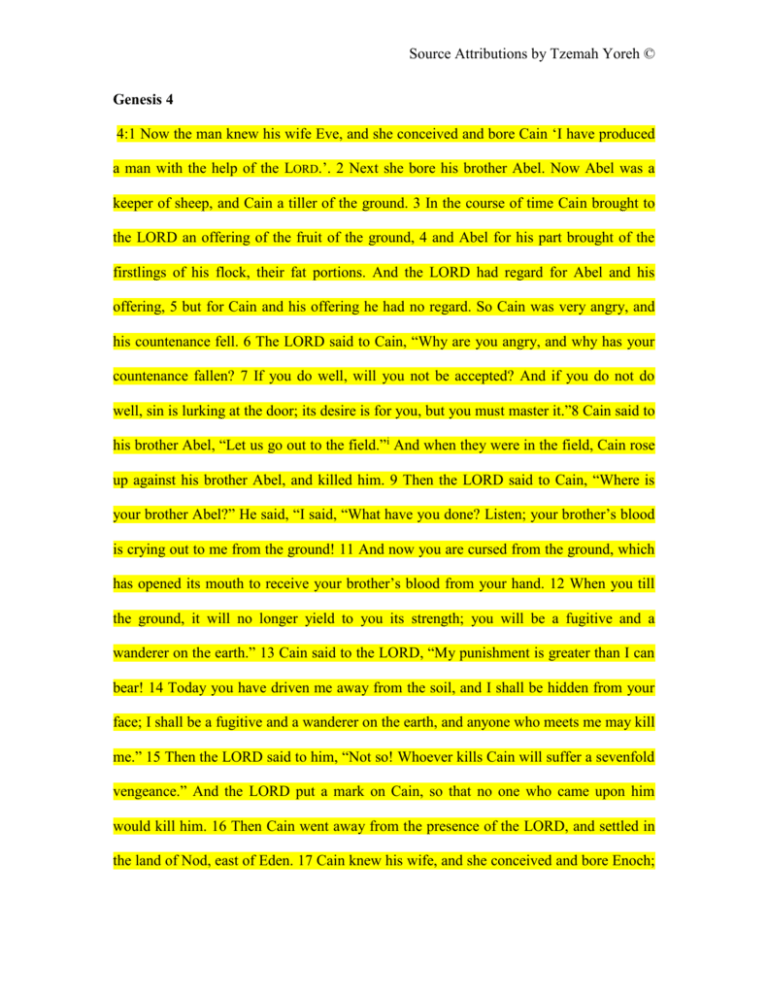
Source Attributions by Tzemah Yoreh © Genesis 4 4:1 Now the man knew his wife Eve, and she conceived and bore Cain ‘I have produced a man with the help of the LORD.’. 2 Next she bore his brother Abel. Now Abel was a keeper of sheep, and Cain a tiller of the ground. 3 In the course of time Cain brought to the LORD an offering of the fruit of the ground, 4 and Abel for his part brought of the firstlings of his flock, their fat portions. And the LORD had regard for Abel and his offering, 5 but for Cain and his offering he had no regard. So Cain was very angry, and his countenance fell. 6 The LORD said to Cain, “Why are you angry, and why has your countenance fallen? 7 If you do well, will you not be accepted? And if you do not do well, sin is lurking at the door; its desire is for you, but you must master it.”8 Cain said to his brother Abel, “Let us go out to the field.”i And when they were in the field, Cain rose up against his brother Abel, and killed him. 9 Then the LORD said to Cain, “Where is your brother Abel?” He said, “I said, “What have you done? Listen; your brother’s blood is crying out to me from the ground! 11 And now you are cursed from the ground, which has opened its mouth to receive your brother’s blood from your hand. 12 When you till the ground, it will no longer yield to you its strength; you will be a fugitive and a wanderer on the earth.” 13 Cain said to the LORD, “My punishment is greater than I can bear! 14 Today you have driven me away from the soil, and I shall be hidden from your face; I shall be a fugitive and a wanderer on the earth, and anyone who meets me may kill me.” 15 Then the LORD said to him, “Not so! Whoever kills Cain will suffer a sevenfold vengeance.” And the LORD put a mark on Cain, so that no one who came upon him would kill him. 16 Then Cain went away from the presence of the LORD, and settled in the land of Nod, east of Eden. 17 Cain knew his wife, and she conceived and bore Enoch; Source Attributions by Tzemah Yoreh © and he built a city, and named it Enoch after his son Enoch. 18 To Enoch was born Irad; and Irad was the father of Mehujael, and Mehujael the father of Methushael, and Methushael the father of Lamech. 19 Lamech took two wives; the name of the one was Adah, and the name of the other Zillah. 20 Adah bore Jabal; he was the ancestor of those who live in tents and have livestock. 21 His brother’s name was Jubal; he was the ancestor of all those who play the lyre and pipe. 22 Zillah bore Tubal-cain, who made all kinds of bronze and iron tools. The sister of Tubal-cain was Naamah.23 Lamech said to his wives: “Adah and Zillah, hear my voice; you wives of Lamech, listen to what I say: I have killed a man for wounding me, young man for striking me.24 If Cain is avenged sevenfold, truly Lamech seventy-sevenfold.ii 25 Adam knew his wife again, and she bore a son and named him Seth, for she said, ‘God has appointed for me another child instead of Abel, because Cain killed him.’ 26 To Seth also a son was born, and he named him Enosh. At that time people began to invoke the name of the LORD. Vocabulary Markers – Note the use of the qal passive form yulad (was born) in vs. 26, which appears in the post priestly (Bridger) genealogies of Chapter 10, as well as in Gen 22:20-22, and in many other places, P uses the hiphil (vayoled – he fathered, as throughout Genesis 11, or the niphal (hivaled – was born) form, as in Genesis 21:5, of the verb ( ילדto give birth). Source Attributions by Tzemah Yoreh © Stylistic Markers – The short genealogical style of vs. 18 (J) is markedly different from the organized list of Chapter 5 (P), which details the number of years each person lived and when they bore children. General Comments: In Genesis 4, part of the Yahwistic composition, Cain kills his brother Abel in cold blood. The reader expects some sort of retribution, and prima facie, it seems that Cain is indeed punished: Yhwh pronounces that "the earth will not give you of her strength" (4:11) and that Cain shall be forced to wander in order to scratch out his sustenance. If the punishment is examined more closely however, one finds that it is in fact only an echo of the harshly worded curse God pronounces upon Adam. The mild language used in the description of Cain's sentence is in marked contrast with the graphic description of Cain culpability: "The blood of your brother screams to me from the earth." (4:10) Furthermore, it would seem that Cain's punishment of exile is never really carried out, he is described as "settling" in the land of Nod (4:16) – an obvious wordplay on the content of the punishment (na' vanad) thus making subtle mockery of it - and he builds the first city (4:17), both marked signs of sedentary lifestyle. Even if Cain was exiled it is clear that in the Pentateuchal law codes the punishment does not fit the crime. Exile is enumerated as a possible punishment for murder in the Pentateuchal law codes, but only in cases when the murder is accidental. This, however, is not the most mystifying element of the account. Yhwh's promise to protect Cain from retribution, by providing him with the proverbial: "Cain's mark", which Source Attributions by Tzemah Yoreh © would ensure a sevenfold revenge, borders on the extraordinary. The fact that people would wish to kill Cain is only natural and entirely just according to the law codes of the time, Cain did kill his brother in cold blood after all. No protection is provided to a person who kills his or her fellow in cold blood according to Deuteronomy. In fact, it is the closest living relative's responsibility to kill the murderer. Lemech, Cain's descendant, brags that if Cain were to be revenged sevenfold for his death, than he, Lemech, who also is guilty of murder should be revenged seventy seven fold in case of his (Lemech’s) untimely demise. Lemech's pronouncement can be understood as a mockery of Yhwh's promise to Cain to keep from harm. How can a murderer expect retribution in the case of his death? His death, according to all conventional legal systems is entirely justified. Abel's blood then continues to scream across the generations, and who shall answer it? Who shall punish the first murderer? The answer that J provides is the flood. Cain's fratricide marks the antedelluvian (preflood) generation as evil and sets the stage for the cataclysmic flood which follows immediately. The answer P provides is evident in Chapter 5, and see the commentary there. i The Septuagint (the Ancient Greek translation) upon which the English is based, "adds" the content of Cain's interaction with his brother Abel which does not exist in the Hebrew Source Attributions by Tzemah Yoreh © (Masoretic text). The question of whether the fuller Septuagint version reflects the genuine version or the Hebrew (Masoretic text) does is debated among scholars. ii Note the switch of divine names from Yhwh (the Lord) to Elohim (God) in the final verses of Chapter 4, and then back again. Vs. 26 explains the switch from Elohim to Yhwh as one of human initiative. This theological program is likely a secondary explanation of the switch that indeed occurs after Chapter 3 in the text. The familiarity of this source with both the narrative of Chapter 4 (the death of Abel) and the genealogical list of Chapter 5 (the birth of Seth), may also indicate a later date of composition. In this commentary it is attributed to B, the bridging source.
